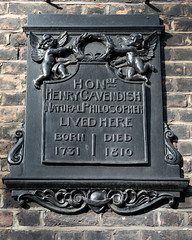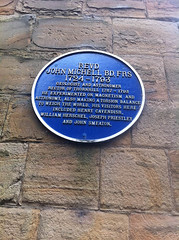Henry Cavendish
Commemorated on 2 plaques
Hon ble Henry Cavendish natural philosopher lived here born 1731 died 1810
11 Bedford Square, London, United Kingdom where they lived
Revd John Michell BD. FRS 1724-1793 geologist and astronomer. Rector of Thornhill 1767 - 1793. He experimented on magnetism and astronomy, also making a Torsion balance to weigh the world. His visitors here included Henry Cavendish, William Herschel, Joseph Priestley and John Smeaton.
Thornhill Parish Church, Church Ln, Thornhill, Dewsbury, United Kingdom where they visited



